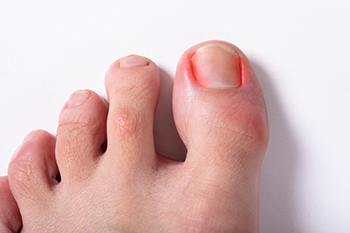
Even if it does not cause pain, it is recommended that one does not ignore an ingrown toenail. Ingrown toenails happen when the corner or side of the toenail grows into the surrounding flesh, leading to pain, discomfort, inflammation, and sometimes infection. Initially a minor annoyance, untreated ingrown toenails can escalate into a recurring and serious issue. Treatment methods depend on the ingrown toenail's severity, the presence of infection, and previous treatments that were attempted. Routine podiatry care, including toenail trimming and addressing underlying issues, can help prevent infected ingrown toenails. Options range from daily foot soaking and antibiotics to more invasive nail avulsion procedures, which involve removing the affected toenail. If you have an ingrown toenail, it is strongly suggested that you make an appointment with a podiatrist for treatment.
Ingrown toenails can become painful if they are not treated properly. For more information about ingrown toenails, contact Leonora Fihman, DPM of California. Our doctor can provide the care you need to keep you pain-free and on your feet.
Ingrown Toenails
Ingrown toenails occur when a toenail grows sideways into the bed of the nail, causing pain, swelling, and possibly infection.
Causes
- Bacterial infections
- Improper nail cutting such as cutting it too short or not straight across
- Trauma to the toe, such as stubbing, which causes the nail to grow back irregularly
- Ill-fitting shoes that bunch the toes too close together
- Genetic predisposition
Prevention
Because ingrown toenails are not something found outside of shoe-wearing cultures, going barefoot as often as possible will decrease the likeliness of developing ingrown toenails. Wearing proper fitting shoes and using proper cutting techniques will also help decrease your risk of developing ingrown toenails.
Treatment
Ingrown toenails are a very treatable foot condition. In minor cases, soaking the affected area in salt or antibacterial soaps will not only help with the ingrown nail itself, but also help prevent any infections from occurring. In more severe cases, surgery is an option. In either case, speaking to your podiatrist about this condition will help you get a better understanding of specific treatment options that are right for you.
If you have any questions please feel free to contact our offices located in Encino and Brentwood, Los Angeles, CA . We offer the newest diagnostic and treatment technologies for all your foot and ankle needs.
